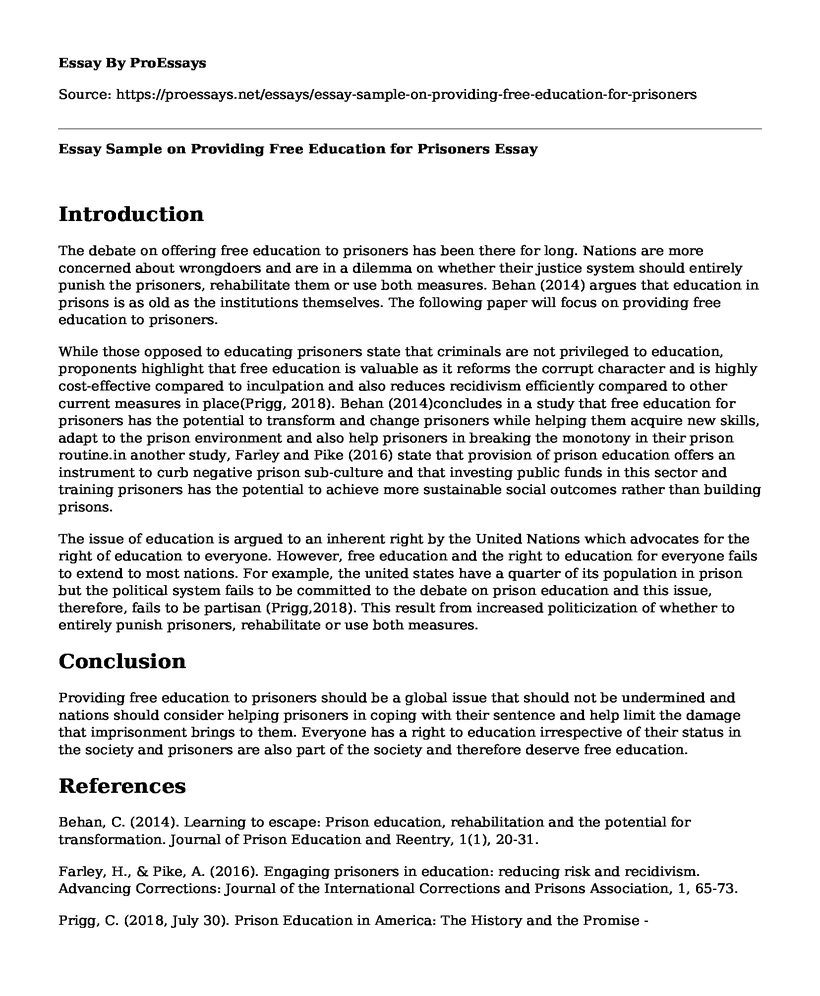Introduction
The debate on offering free education to prisoners has been there for long. Nations are more concerned about wrongdoers and are in a dilemma on whether their justice system should entirely punish the prisoners, rehabilitate them or use both measures. Behan (2014) argues that education in prisons is as old as the institutions themselves. The following paper will focus on providing free education to prisoners.
While those opposed to educating prisoners state that criminals are not privileged to education, proponents highlight that free education is valuable as it reforms the corrupt character and is highly cost-effective compared to inculpation and also reduces recidivism efficiently compared to other current measures in place(Prigg, 2018). Behan (2014)concludes in a study that free education for prisoners has the potential to transform and change prisoners while helping them acquire new skills, adapt to the prison environment and also help prisoners in breaking the monotony in their prison routine.in another study, Farley and Pike (2016) state that provision of prison education offers an instrument to curb negative prison sub-culture and that investing public funds in this sector and training prisoners has the potential to achieve more sustainable social outcomes rather than building prisons.
The issue of education is argued to an inherent right by the United Nations which advocates for the right of education to everyone. However, free education and the right to education for everyone fails to extend to most nations. For example, the united states have a quarter of its population in prison but the political system fails to be committed to the debate on prison education and this issue, therefore, fails to be partisan (Prigg,2018). This result from increased politicization of whether to entirely punish prisoners, rehabilitate or use both measures.
Conclusion
Providing free education to prisoners should be a global issue that should not be undermined and nations should consider helping prisoners in coping with their sentence and help limit the damage that imprisonment brings to them. Everyone has a right to education irrespective of their status in the society and prisoners are also part of the society and therefore deserve free education.
References
Behan, C. (2014). Learning to escape: Prison education, rehabilitation and the potential for transformation. Journal of Prison Education and Reentry, 1(1), 20-31.
Farley, H., & Pike, A. (2016). Engaging prisoners in education: reducing risk and recidivism. Advancing Corrections: Journal of the International Corrections and Prisons Association, 1, 65-73.
Prigg, C. (2018, July 30). Prison Education in America: The History and the Promise - PrisonEducation.com. Retrieved from https://prisoneducation.com/prison-education-news/prison-education-in-america-the-history-and-the-promise/
Cite this page
Essay Sample on Providing Free Education for Prisoners. (2022, Nov 22). Retrieved from https://proessays.net/essays/essay-sample-on-providing-free-education-for-prisoners
If you are the original author of this essay and no longer wish to have it published on the ProEssays website, please click below to request its removal:
- Ambition for Lifestyle Change Essay
- Drug Abuse and the Problem of Criminalization Essay
- Research Paper on Ted Bundy
- Essay Example on Obama Care in Texas: Challenges for Payers
- Culturally Responsive Instruction in U.S Schools: Essential for a Diverse Society
- TDA 2.16 Support Children and Young People With Play and Leisure Essay
- Prison Abolition: A Call to Prevent Crimes, Not Cure Them - Essay Sample







